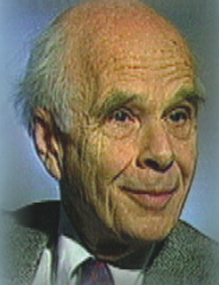Origine: You Can Change the World (2003), p. 86.
Ervin László: Frasi in inglese
“Cultures are, in the final analysis, value-guided systems.”
Origine: The systems view of the world (1996), p. 75.
Origine: The systems view of the world (1996), p. 76.
Ludwig von Bertalanffy, Ervin László (1972) The Relevance of general systems theory: papers presented to Ludwig von Bertalanffy on his seventieth birthday. p. 185.
Ervin Laszlo (2007) Science and the Akashic Field: An Integral Theory of Everything. p. 120.
Origine: Introduction to Systems Philosophy (1972), p. 44.
Origine: The systems view of the world (1996), p. 11.
Laszlo (1992) "Information Technology and Social Change: An Evolutionary Systems Analysis". Behavioral Science 37: p. 247.
Variante: Each system has a specific structure made up of certain maintained relationships among its parts, and manifests irreducible characteristics of its own.
Origine: Introduction to Systems Philosophy (1972), p. 12.
Ervin Laszlo, Jude Currivan (2008) CosMos. p. 101.
Origine: Evolution: the general theory (1996), p. 28.
Origine: The systems view of the world (1996), p. 12.
Origine: Introduction to Systems Philosophy (1972), p. 120.
Laszlo (1991) The Age of Bifurcation: Understanding the Changing World. Philadelphia: Gordon & Breach. p. 112; As cited in: K.L. Dennis (2003, p. 69).
E. Laszlo et al. (1993) pp. xvii- xix; as cited in: Alexander Laszlo and Stanley Krippner (1992) " Systems Theories: Their Origins, Foundations, and Development http://archive.syntonyquest.org/elcTree/resourcesPDFs/SystemsTheory.pdf" In: J.S. Jordan (Ed.), Systems Theories and A Priori Aspects of Perception. Amsterdam: Elsevier Science, 1998. Ch. 3, pp. 47-74.
Laszlo (1986) "Technology and Social Change: An Approach from Nonequilibrium Systems Theory". Technological Forecasting and Social Change 29, p. 280; As cited in: K.L. Dennis (2003) An evolutionary paradigm of social systems. p. 38.
Origine: Introduction to Systems Philosophy (1972), p. 19; As cited in: Bela H. Banathy (1996) Designing social systems in a changing world. p. 156.
Origine: The systems view of the world (1996), p. 10-11.
Laszlo (1992) "Information Technology and Social Change: An Evolutionary Systems Analysis". Behavioral Science 37: pp.237-249; As cited in: K.L. Dennis (2003, p. 36).
Origine: Cosmos: A Co-creator's Guide to the Whole-World (2010), p. ix.
E. Laszlo (1994) Vision 2020: Reordering Chaos for Global Survival. Philadelphia: Gordon & Breach.
Origine: Introduction to Systems Philosophy (1972), p. 80.
Origine: Introduction to Systems Philosophy (1972), p. xvii.
Origine: Introduction to Systems Philosophy (1972), p. 83.
Origine: Introduction to Systems Philosophy (1972), p. xix.
Origine: The systems view of the world (1996), p. 85-86 as cited in: Sherryl Stalinski (2005, p. 23).
Origine: The systems view of the world (1996), p. 80 as cited in: Sherryl Stalinski (2005) A Systems View of Social Systems, Culture and Communities. Saybrook Graduate School. p. 11.
Origine: Introduction to Systems Philosophy (1972), p. 79.
Origine: Introduction to Systems Philosophy (1972), p.xviii.
Origine: The systems view of the world (1996), p. 8 as cited in: Martha C. Beck (2013) "Contemporary Systems Sciences, Implications for the Nature and Value of Religion, the Five Principles of Pancasila, and the Five Pillars of Islam," Dialogue and Universalism-E Volume 4, Number 1/2013. p. 3 ( online http://www.emporia.edu/~cbrown/dnue/documents/vol04.no01.2013/Vol04.01.Beck.pdf).
